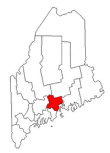|
Wilbur
Buck will always be a hero in the
hearts of his children, and to the
many who were privileged to know
and love him. His daughters,
Wilma Warman and Sandra Fox Buck
were among the group of veterans
and their families who attended
the Special Recognition Service to
honor the World War II U.S. Army
soldiers of Company K of the 103rd
Infantry, 43rd
Division, in Augusta, ME on June
18, 2011. It was there that
Wilma and Sandra were presented
with the State of Maine Silver
Star Honorable Service Medal, for
those in Co. K, who were wounded
in combat, and who had been
awarded a Purple Heart Medal.
Wilbur
began life as a premature infant,
the son of Jephtha and Susie
(Morse) Buck, weighing only a few
pounds. His
great-grandmother, Susan (Shea)
Morse had delivered him on August
11, 1915 in a small apartment over
a barn in Belfast, ME. She
felt that he had little chance of
surviving. He was fed a
mixture of a drop of whiskey,
sugar and water. He was so
small that he slept in a boot box
in front of the wood cook stove
oven to keep him warm.
He was
small and sickly as a child,
causing him to miss much school.
He moved with his parents to
his mother’s family home place
where she had been born. His
great-grandmother was the head of
the household, and several young
aunts and uncles also resided
there. One cold winter day
Susie couldn’t find young Wilbur,
who had not yet started school.
She followed his tracks
through the snow to Greer’s Corner
School, where she found him
sitting on the double-seat desk
with Uncle Amon, who was twelve
years older than him. He
cried and wanted to stay with
Aimee.
|
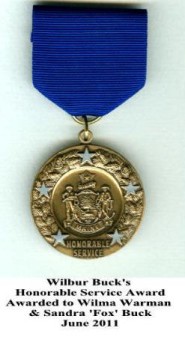 |
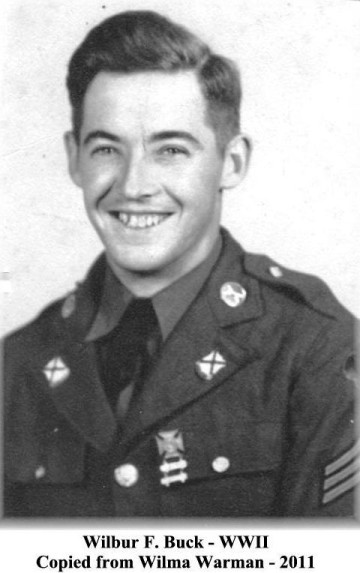 |
Wilbur
entered grade school at Greer’s
Corner School, where he attended
for eight years. He went on
to Crosby High School in Belfast,
graduating in 1935. On July
19, 1940 he joined the National
Guard in Belfast, with several of
his childhood chums. He
worked at McCorrison’s Garage in
Thorndike, probably living with
Grampa John Morse in Knox.
He worked for Earl A. Cross
& Sons doing water well
drilling with his friends, the
Cross brothers. He also
helped his father, Jephtha, on the
home farm.
In
February, 1941, months before the
bombing of Pearl Harbor, Co. K.
was given orders that they were to
be activated and inducted into the
regular Army. They were
given individually-fitted new
uniforms, which they wore to the
special farewell service on
February 9 at the Methodist Church
in Belfast. The
Republican Journal reported
that it was one of the most
impressive services in the history
of Belfast. The soldiers
marched in full dress uniforms
from the Armory in the Opera House
on Church Street to the Methodist
Church on Miller Street, under the
escort of Capt. Everard A. Bailey
and Lieut. Byron M. Salter to
their seats in the church with the
hearts of men, women and children
bursting with mixed pride,
prayerfulness and sorrow, to the
opening song, Onward Christian
Soldiers. There were
seventy-four men and four officers
present.
|
On February 24th,
the men marched seventy-two strong down
Main Street to the waiting train near the
waterfront in Belfast for the ride to
Portland where they were to be inducted.
The hearts of the City swelled with
pride, while the soldiers faced dangers
that no one then could imagine.
School children cheered them on, as
the Belfast Band played, and the crowd
sang God Bless America. Little did
they know on that day that twelve of them
would not return home with them. It
was an emotional time for parents,
siblings, friends, neighbors and
relatives. The soldiers went on to
Boot Camp at Fort Blanding in Florida for
combat training. Wilbur received
some training in Mississippi.
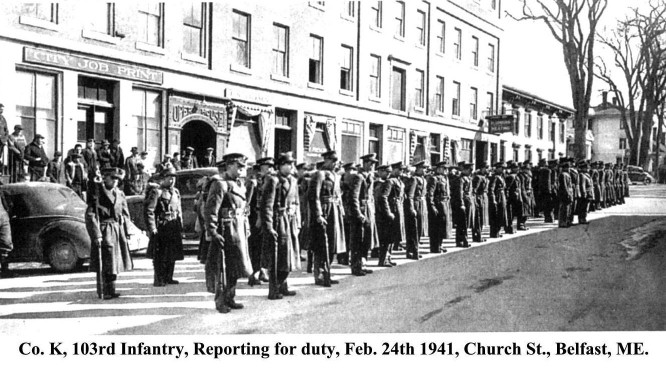 |
Wilbur married
Marion Bonney, called Alice, on Feb. 3,
1941, just three weeks before being
shipped out. On Oct. 2, 1942, Co. K
was bound for the South Pacific Islands.
Wilbur said that the longest
distance that he had traveled before his
Army life was with a load of Christmas
trees from Belmont, Me. to Boston, Mass.
This trip was much longer, going
from Belfast, to Portland, ME., on to
Mississippi, and Fort Blanding, Florida,
from there to the jungles of New Georgia,
located in the Solomon Islands, to rest
camp in New Zealand, to the foxholes of
New Guinea, from Guadalcanal to Luzon.
New Georgia had about a dozen large
islands. It also had several small
islands. The jungles were certainly
unfamiliar territory to the soldiers.
It was hot, swampy, and much
different that the small farm in Belmont,
Maine where Wilbur had been raised.
Wilbur said of
one battle, of one hundred and eighty-six
men, only thirty-six survived. He
had seen much in his days in the Army.
He was wounded, for which he
received the Purple Heart medal.
Like a lot of veterans, he didn’t
talk about his wounds. He said of the
shrapnel that he carried, “As long as it
doesn’t bother, they let you wear it!”.
Wilbur was honorably discharged as a
Technical Sergeant on Sept. 28, 1945 at
Fort Devens, Mass. It was said of
Co. K, that they left on a train, and came
home in a taxi. Wilbur received a
Good Conduct Medal at the time of
discharge in 1945; an American Defense
Service Medal, Asiatic Pacific Campaign
Medal; his Purple Heart Medal, as well as
other medals.
After
his discharge, Wilbur came home to his
family, and to the Marriner farm in
Belmont near his parents that Alice had
purchased while he was away. He
worked during the winter months at the
largest chicken house in Waldo County
owned by the Berry brothers in Morrill.
He became a Forestry Warden, manning
the Frye Mountain Fire Tower in Montville,
ME. In 1947, he spent a week
fighting a fire in Southern Maine.
He drove a forestry truck, and went
to schools to teach children about fire
prevention.
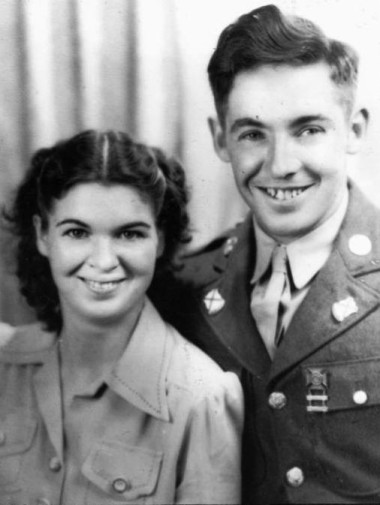
Alice
(Bonney) and Wilbur F. Buck -
WWII
|
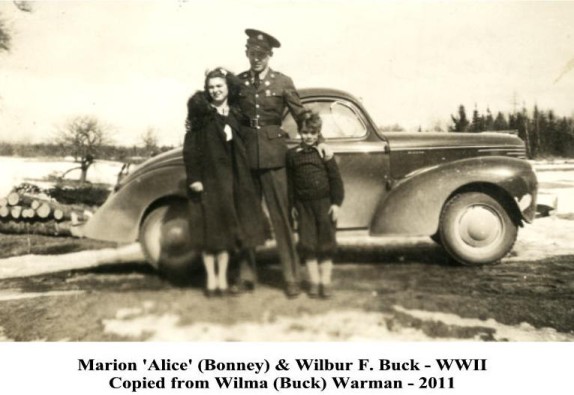 |
Wilbur planted
a large garden each summer to help feed
his family. He and Alice were the
parents of Wilma, Mary, Robert Jephtha,
who was born and died in 1947, Gerald,
Sandra, Marcia and Lori. They recall
their father playing with them in the
backyard, the picnics, the drives to
historical places, and going to the Fire
Tower with him. He caught alewife
fish in the spring, and smoked them in a
home-made smoke house. He was a
sharpshooter, and an avid hunter, getting
a deer each season to supplement his
family’s food supply. He reloaded
his rifle shells, often showing others how
to do it. He also hunted with a
Civil War Musket long rifle which he made
bullets for. He was a Civil War
scholar, and enjoyed reading and
collecting books about the War.
Around 1950,
Wilbur became a mailman, with a long mail
route covering Belmont, Morrill, and a
part of Montville, some of which included
back roads of rural country. He was
a hero to his postal patrons, going far
above and beyond his duties, gaining
praises from the patrons for all that he
had done for them. When Ada Gurney
was aged and unable to walk to her
mailbox, he obtained a mailbox post and
put it by her porch so that she could
easily get her mail. He picked up
prescriptions and supplies in Belfast for
those who could not get out of their
homes. He would check at the door if
a person had not gotten their mail the day
before. In those days, patrons put a
letter and change in the box to mail a
letter. He obliged by putting the stamp on
the mail. One patron often put her
letters in the box with no change.
He would put the proper postage on
for her, and never charge. He always
had candy for the children. For some
patrons, he was their only contact with
the outside world. Some would wait
by the mailbox for the conversation.
The patrons gave glowing reports of
how they had been assisted by Wilbur.
He once came upon a deceased couple
in the snow on Muzzy Ridge.
Apparently the elderly woman had
gone for the mail, and for some reason had
fallen. Her elderly partner had gone
to help, and both perished in the snow.
About
the time that Wilbur became a mailman, his
farmhouse on the Howard Road in Belmont
burned. He and Alice lost much of
their family possessions. He rebuilt
the house, with the assistance of his
Uncle Everett Morse. Many years
later, they sold the house, and in the
1970’s, he and Alice had a new house built
in the field across from where the
farmhouse had been, with a beautiful view
of Levenseller Mountains. It was
there that they lived for the remainder of
their days. Wilbur’s grandmother was a
Levenseller.
In January
1977, when President Gerald Ford pardoned
Tokyo Rose, who had been convicted of
treason, for being a propaganda artist
Wilbur was interviewed, asking him his
opinion about the pardon. Wilbur
replied that the soldiers enjoyed her
programs, which played popular songs,
while she told the soldiers that they
should surrender, for one reason or
another. He said that their morale
was not affected by her, and they enjoyed
hearing the music.
Wilbur was
diagnosed with cancer in 1981, causing him
to retire from the Postal Service after
thirty-four years. The people on his
mail route never again had the caring
delivery that Wilbur had given. He
didn’t set back and retire. He
purchased woodworking machinery, and set
up a shop in his basement. He built
shelves for his home, and for others.
After seeing a clock from Florida in
the shape of that State, he started making
clocks in the shape of the State of Maine.
He cut them out from two-inch wood,
sanded and darkened the edges with a
torch. He then heavily covered them
with a resin combination, putting gold
numbers on before covering them with more
resin. They were popular, and he
mainly made them for gifts. He made
a Regimental Shield of Company K, which he
took to the Regiment’s reunions. He
also made a clock with the four-leaf
clover, an emblem of Co. K. He was a
historian for the Company, collecting
memorabilia associated with the Company,
such as yearbooks, clippings, etc.
The memories he, as well as so many
other war veterans, kept locked up in his
mind.
He enjoyed
working with the youth, and many days had
neighborhood young people in his
woodworking shop, teaching them to safely
use the machinery and tools. If
there was a fire, or accident in town,
Wilbur would be one of the first to work
on a fund-raiser.
He had a sense
of humor. He was always willing to
lend a hand, and to lend some of his
equipment. Once he had loaned a
garden tool to a cousin, who had not
immediately return it. When Wilbur
needed it for his own garden, he looked
the tool up. He said, “If a person
is good enough to loan something, they
should be good enough to go get it!”
Wilbur was
active in his community. In 1954,
when the Town of Belmont voted to build a
new school, after out-growing the one-room
Greer’s Corner school, Wilbur donated a
piece of land on which to build the new
schoolhouse, which in 2011, is the Belmont
Town Office and Community Center. He
donated his labor as well, to help build
the school. For many years he was
the Moderator at the Annual Belmont Town
meeting.
He was a Boy
Scout Master while his son, Gerald was
growing up. The Scouts met in the
Grange Hall in Morrill Village. He
would let them go to the back of the
neighboring store and play pinball after
their meetings. They played
basketball, and he also taught them hunter
safety and target practice in the gravel
pit in the Village. He would deliver
each Scout back to their homes, to see
them to their door, even though some were
within walking distance of home.
Each Sunday morning, he would pick
up neighborhood children to take them to
Sunday School in Morrill Village.
Wilbur was a
member of Mystic Grange in Belmont.
In 1986, he was awarded a Community
Service award from Pomona Grange # 12, and
was named “Man of the Year”. He was
a member of Quantabacook Lodge of Masons
in Searsmont. He was a member of the
Veterans of Foreign Wars, Chapter
Commandant, a Charter member of the
Belmont Fire Department on which he served
for fifty years; a member of the first
Belmont Cemetery Committee; he was a
charter member and officer of the Tri-Town
Snowmobile Club; he was a Charter member
and first President of Greene Plantation
Historical Society in 1989.
In June, 1989,
Wilbur was stricken with a devastating
stroke, which left him unable to do what
he had formerly done. He died on
June 29, 1997 at the Veterans Hospital at
Togus, in Chelsea, Me., at the age of
eighty-one years. He and Alice had
been married for fifty-six years. He
had spent all of his life, excepting the
first three years of life, and his Army
years, in Belmont, Me. where he is buried
in Hillside Cemetery. Thus ended the
fruitful life of a man who lived life to
the fullest, and was a friend to all.
Thanks to
the Buck family for family and newspaper
data for the basis of this story.
|


